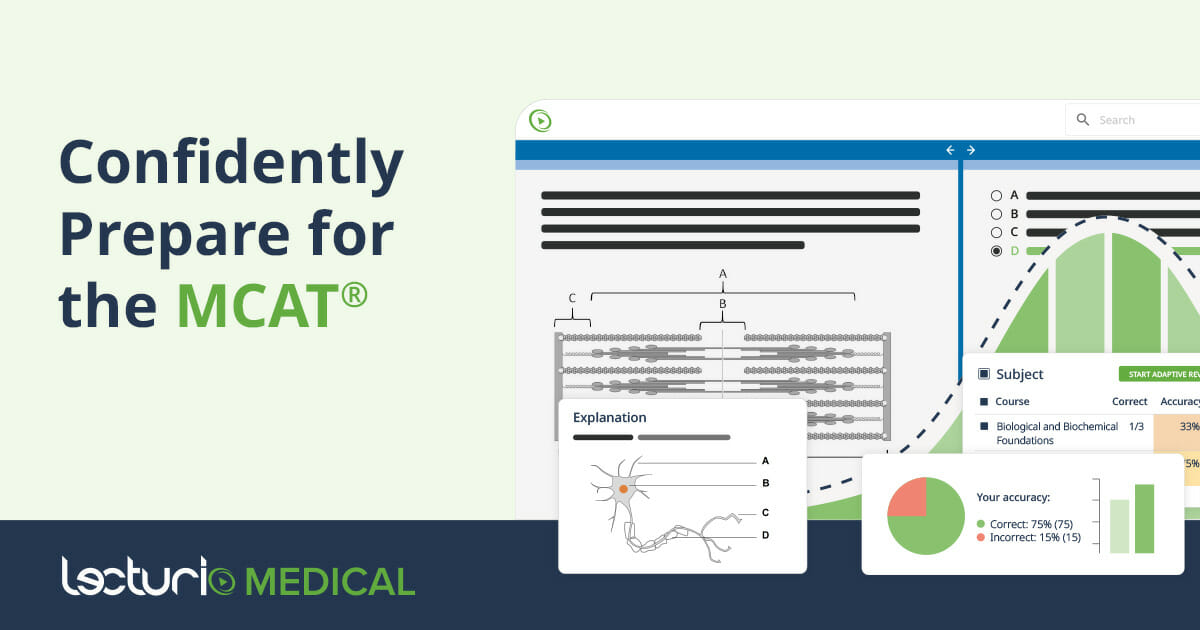Of course, registering isn’t the hardest part of the MCAT, but it does come with its own challenges. There are documents you need, fees to resolve, and scheduling problems that come with the registration process. But challenges shouldn’t stop you from seeing it through.
Keep reading for a guide on how you can register for the MCAT and answers to some frequently asked questions about registering. Hopefully, this article will help ease the process and make you feel more confident about taking the MCAT. Before we get into that, let’s have a brief summary of the MCAT.
What is the MCAT?
The Medical College Admission Test (MCAT) is a computer-based aptitude and knowledge exam. The MCAT is composed of 4 sections:
- Biological and Biochemical Foundations of Living Systems
- Chemical and Physical Foundations of Biological Systems
- Psychological, Social, and Biological Foundations of Behavior
- Critical Analysis and Reasoning Skills
There’s no passing score, only scores that your school of choice will be willing to accept. Apart from that, the MCAT score is just among the many things that schools consider when choosing applicants.
The test was developed and is administered by the Association of American Medical Colleges (AAMC), and it’s through their site where you’ll first make your account to register for the MCAT. That’ll be your first step in the process. There, you’ll be able to make your profile, schedule your test, pay for the exam, and even find review materials for the MCAT.
Registering for the MCAT: step-by-step
The AAMC site makes it extremely easy and simple to register for the exam. So I’ve summarized it here for you in 10 easy steps!
- Create an AAMC account
- Use you AAMC ID to sign into the MCAT Registration System
- Click on “Start Exam Registration” under the Exam Registration
- Fill out Personal Information and make sure your name is the same as what’s on your MCAT-Accepted ID
- Fill out your Biographic Information
- Fill out your Background
- Read through the terms and conditions and the release of personal information tabs
- View the exam schedule and pick a time and place that works best for you
- Pay the application fee
- Complete the MCAT Registration Survey
Am I eligible to take the MCAT?
First, you have to know which programs require an MCAT. What qualifies you isn’t a specific prerequisite course. You qualify simply by the intention of attending a health-related professional school. The programs include, but are not limited to:
- Doctor of Medicine (MD)
- Doctor of Osteopathic Medicine (DO)
- Doctor of Podiatric Medicine (DPM)
- Doctor of Veterinary Medicine (DVM)
What if you’re an international student? You have to apply to the American Medical School Application Service (AMCAS). They’re usually in charge of facilitating your application process, but it doesn’t accept foreign transcripts unless you’re from an accredited U.S., U.S. Territorial, or Canadian post-secondary institution. Otherwise, you can still add your course and transcripts but they won’t be verified
If you don’t plan to attend a health professional school, you will need “special permission” to take the MCAT. You’ll need to send AAMC an email and your request will be reviewed before you can proceed further with the application process.
What are the prerequisites to registering for MCAT? Are there courses I need for the MCAT?
There are no required courses you need to take the MCAT. Again, what you need is the intention to attend a health-related professional school. However, you can take courses on the content that will be tested on the MCAT to prepare. Here are some suggested courses that you should get at least a semester of:
- General Chemistry
- Organic Chemistry
- Biochemistry
- Biology
- Psychology
- Sociology
Biology in particular is the most tested topic in the MCAT, so make sure you get at least a year of biology-related courses. Try not to take advanced courses first. Instead, cover all the basics. Those are the most frequently-tested topics and you can infer your answers for advanced questions with enough understanding of the basics.
Where do I register for the MCAT?
As mentioned earlier in the article, first make an account on the AAMC website. Also, don’t forget to follow @AAMC_MCAT on Twitter for updates. Then, access the MCAT registration system and make your AAMC ID. If you have an AAMC ID already from a facilitating body, you can use that one. AAMC warns not to create a new AAMC account, instead if you forget your password, simply reset it.
Afterwards, you can register for the MCAT on AAMC. There, you can schedule your preferred date. You can even schedule alternate dates that work for you if your first choice isn’t available. After you’ve registered, you must pay the exam fees.
How much is MCAT registration?
The initial cost of the exam is $330. This already covers both the exam and the distribution of exam results. However, there are other expenses associated with your travel and overnight accommodations at the exam sites, especially if you’re an international student. If there’s no testing site in your country, traveling to the nearest available site internationally can be pricey. If you reschedule your exam, that will also cost a fee.
AAMC mentions that there’s a Fee Assistance Program (FAP) for those who can’t afford to take the exam.
When should I take the MCAT?
Many students ask this question because different people take the MCAT at different times of their lives. Firstly, you have to ask yourself, “When do I want to go to medical school?” You’ll want to take the exam close to when you want to start because your score is only valid for a limited time, depending on your medical school of choice.
Next, consider the possibility that you might have setbacks. You might get a lower score than you would like. You might not be ready on the test date. You might not have the funds to take the test or travel to take the test. Try to plan for the possibility that you might need time to retake the exam or prepare for it again in case it doesn’t go the way you want on the first try.
If you want to start as soon as possible, you can take the MCAT during your late sophomore or junior year, around spring or summer. That way, you can go straight to medical school after graduating. However, there are also students who want to take a break (one or two years, usually). In that case, you can take it after your senior year. For the review time, it depends on your own pacing and if you’re working/studying while reviewing for the MCAT.
When should I start studying for the MCAT? Should I get tutoring for MCAT?
While students have differing paces from one another when it comes to studying, some sites say that the minimum time for review is 2 months. According to AAMC, the average for students is 3 months, studying 20 hours per week. You don’t want to start too early, because you’ll forget what you studied first. You don’t want to start too late, because you’ll end up cramming.
If you’re having trouble figuring out how to study, Lecturio already has you covered with an article about how to best study for the MCAT. There’s also a MCAT preparation course covering the subjects you need to study.
How long should I wait before I retake the MCAT? How many times can I retake it?
Most examinees can pass the MCAT after one or two takes. Only less than 1% take the test more than 3 times before they pass. Still, it’s a big blow to know you have to review and take the exam all over again. Of course, since you’ve just finished studying, you don’t necessarily start from scratch, so your review time could be shorter than before.
However, instead of starting straight away, I suggest taking a month or two to rest. The most important thing before starting again is to know if you’re in the right mindset for it. Take your time reviewing what you did and how you can do it better. There’s no correct answer on how long you should wait to retake the MCAT. It all depends on your recovery and study pace. But, technically, you can already register for the MCAT again after 24 hours.
The limit for how often you can register for the MCAT is three times in a testing year, four times in two consecutive years, and seven times in your lifetime.
How long are MCAT scores valid?
MCAT score validity depends on the school. However, most medical schools will accept any result done within 2-3 years.
Will I be informed about the availability of my preferred date and time?
Once you register on the MCAT Registration System, you can change your settings to be notified if your test date and location become available, even if their status may be “Not Available” right now.
How do I reschedule my MCAT?
If something comes up, you can reschedule your MCAT date. It’s easy to do on the website. However, it can be pricey, depending on when you’re rescheduling. Take note that it’s cheaper to reschedule than cancel, so you might as well push through with your exam.
How much is it to reschedule my MCAT?
If you reschedule 60 or more days before your exam, it’s $50. If it’s 30-59 days before your exam, it’s $100. If it’s 10-29 days before your exam, it’s $200. After 10 days, rescheduling is no longer possible unless you submit an Emergency Refund Request through the MCAT Registration System. Hence, always plan ahead and reschedule as early as possible if you’re not sure about your availability on the exam date.




